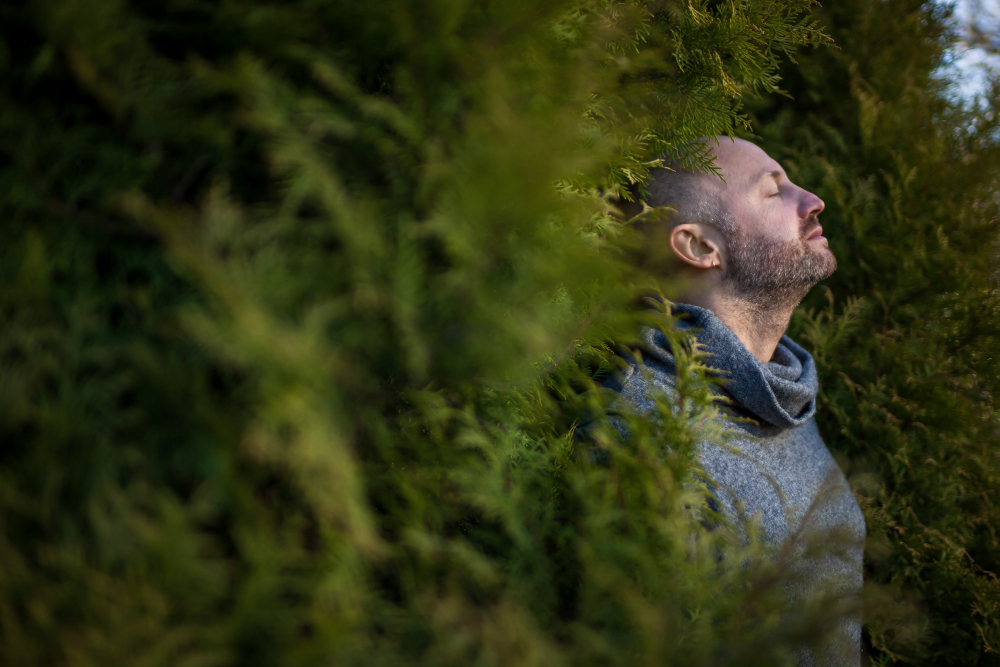
I learnt how to breathe better and it changed my life!
Managing your breathing is a simple, free-of-charge way to improve your life. Trust me on this. I came as a sceptic but I’ve felt the effects and it’s real.
Yet previously the phrase “breathwork” always grated. Breathing happened all the time, it was an effortless, unconscious activity I’d successfully managed all my life. Then someone added the word “work” to it and turned it into something you had to practise and learn, like needlework or woodwork. So I was kind of irritated when I finally started experimenting – and discovered that I was wrong. Breathing techniques really do ease anxiety, improve concentration, athletic performance and sleep, and help you burn fat. Oh, and give you a harmless drug-like high, should you so desire.
I was lucky with my tutor. James Nestor is the author of the bestselling book Breath. A science journalist by trade, he has become an internationally known advocate for the benefits of controlled, conscious breathing. He is now leading a BBC Maestro course, The Power of Your Breath, and, I discover, shares my fondness for scientific data and my suspicion of anything mystical, magical and incense-scented.
San Francisco-based, he was first directed to a breath class after years of lung-related health issues despite what was, on the surface, an offensively healthy Californian lifestyle.
“I kept getting bronchitis and pneumonia every single year. I was working out, surfing, doing a fair bit of martial arts. The antibiotics worked but it kept happening. A friend of mine suggested a breathing class.”
Living in the historical home of the hippy movement, the place where everyone was once famously advised to wear a flower in their hair, it was not hard to find a suitable venue. “It was the exact scene you would expect, white robes and all that stuff. But it was very powerful. I slept well that night and I felt like I was improving. I went back and really started listening to them, and that led me to begin poring over the science.”
But it was a trip to Greece on a magazine assignment that really exposed him to the untapped potential in breathing techniques. “I was sent to see free diving [underwater activities without apparatus]. These people descend 100 metres down through clear water on a single breath. They all had these huge lungs. I asked if they were born that way and they said no, it was force of will. Anyone can expand their lungs.”
Nestor learned from these extraordinary athletes, and by the end of the week he was able to hold his breath for three-and-a-half minutes. He says that since that time, none of his respiratory issues have recurred.
His experience could obviously be dismissed as a placebo effect or the product of excessive enthusiasm but the research, he is keen to explain, suggests that breathwork can indeed have a dramatic effect on lung conditions. A 2003 study tested a breathing technique on 600 adults with asthma and found that “all experienced significant improvement in asthma with a reduction in symptom, medication and improvement in quality of life”.
Even more conclusive, to a habitual cynic like myself, is the extensive use elite military operatives make of breathing. Who could be less “woo-woo” than the Special Forces? Anyone who has seen the Michael Fassbender thriller The Killer will have noticed the protagonist employing controlled breathing before making his long-range sniper shot. This, it turns out, is entirely true to life.
“I know some guys who train Navy Seals and breathing is everything to them,” says Nestor. “You are supposed to shoot between the heartbeats. The only way to listen to your heartbeat is to control your breath. They do so much breath control.”
So far, I have never been required to assassinate anyone with a telescopic rifle, but like most of us who lead modern, hectic, screen-based lives, I would love the ability to calm a busy mind, ease low-level anxiety and generally live a life with a brain that doesn’t fly about like a pigeon trapped in a train carriage.
Beth Whiting is a UK-based psychotherapist accredited by the British Association of Counselling and Psychotherapy and she is spreading the word on breathwork to the therapy establishment. “It’s underused and underutilised but can have an incredibly powerful effect. Just inviting someone to notice their breath can have a really huge influence.” She is convinced it can have a positive effect on a whole range of mental health issues, including the very severe.
“We are starting to see that traditions of breathwork in yoga and t’ai chi are now being evidenced by neuroscience. It’s a very useful tool for working with people with trauma histories and complex PTSD right through to people with schizophrenia and psychosis,” says Whiting.
It is through yoga practice that most of us meet conscious breathing. Here, typically, people often come to breath with a degree of caution.
Yoga teacher Sophie Scott, who runs water-based classes (Float and Flow), says, “Practising pranayama (yogic breathing) can feel alien at first and many people presume it’s a dark art, but after a while the benefits just come naturally. Learning to focus on and control your breath gives us huge mental and physical benefits, including increased energy, resilience, joy and better sleep.”
Although all these feel appealing, my more modest ambition is to develop a way of managing my feelings when under pressure. I recently received a parking ticket. Like all parking tickets, it was an attack on a hapless individual by a bureaucracy set on crushing the human spirit. How could I halt the gnawing anger and sadness that overwhelmed me when I opened the notification? James Nestor has a solution.
“What’s happening there is your sympathetic nervous system is triggering all that response. If you suddenly get scared, your heart will speed up and your breathing will keep it in that feedback cycle.” Shallow, fast breathing speeds up the heart and increases feelings of vigilance which, in turn, promotes more fast breathing, leaving you trapped in your response.
To counter this, Nestor teaches me a calming technique. Incidentally, this is probably the most useful thing you will read all day. “Take three big inward breaths, one on top of the other with no exhale between them, and let the breath fall out naturally.” He demonstrates and I follow. Each has a tiny pause, and all are through the nose. “And when you come back, breathe steadily, four to six seconds in and four to six seconds out.”
This is signalling to the body that you are safe and everything is OK. I imagine you are trying this now, as I did, and feeling your pulse come down and an increased sense of calm. The technique works in a way that no conscious effort to talk yourself down ever could, and it works, most importantly, without the need to buy into any belief system.
At this point in my masterclass, I’m ready to jump into more demanding exercises and begin enjoying the raft of life-enhancing benefits. Instead, Nestor takes me through some regular, everyday breathing. It turns out that despite my swagger about my ability to keep myself alive through regular inhalation, like most of us, I’ve been doing it wrong.
My habitual breath is a shallow, high-in-the-chest action requiring very frequent intakes. I set up my webcam so he can see me on our Zoom link. (The Maestro classes themselves are pre-recorded.) Nestor has me lying on the floor with a book on my stomach and asks me to breathe in a way that moves the book. I’m breathing into my stomach, then moving the same breath up into my chest before releasing it, and all the time using only my nose.
I’m engaging all of my lungs, not simply the upper part, and by using my nose and not my mouth I’m gaining more oxygen and enjoying the nasal filter effects that keep me from infection and reduce my intake of evil floating things.
The effect is instant – I’m calmer, more alert and can feel the potential of my lungs finally being used. It’s like discovering a hidden door in your own house that’s been concealing a whole other space you’ve never explored before.
He leaves me with some exercises to undertake once our session is over. Equipped with my grounding in basic breathing, I’m taken through a 30-minute programme that is astonishing in its ability to change my mental state without either prescription drugs or (my usual route) expensive cocktails.
The task is one of rhythmic intakes and exhales building to a series of breath-holding exercises. I’m climbing a set of breath-based stairs to longer and longer holds. My discovery is that holding your breath after an exhale takes you to a strange place of silent calm. You can hear your body doing its quiet pulsing business of keeping you alive. You are just being: calm but alert.
What I learned wasn’t an exotic, quasi-religious practice but a way of living more effectively. I am now taking time to use breathing to ease anxious moments and increase my ability to focus.
The core is to remember that breathing is a way of speaking to your most instinctive reactions, and knowing this gives you some control over your response to parking tickets and other spiky objects on your path through life.
Since my session with Nestor, it has become completely natural for me to employ some of his approaches as I start a big meeting, deal with a cancelled train or just suffer a moment of News Despair. It’s not magical, but it gives me a feeling of confidence that I’m not simply being buffeted by every passing incident.
The really exciting development has been my exploration of the longer exercises. These take you somewhere else and leave you altered – calmer, more alert. I implore you to investigate breathwork and can reassure you that, so far, I have not been tempted to purchase a white robe.
James Nestor’s BBC Maestro course on The Power of Your Breath is available on bbcmaestro.com
Source: The Telegraph – Story by Phil Hilton
Love this article and the practical tips! Having read James Nestors excellent book and adopted his methods within my own training and daily routine I can confidently share its benefits with my clients. Thats why breathwork is an important part of my training methodology and is built into Fit Dad Body Plan. Fit Dad Body Plan provides over 40s men with all the tools and resources to build sustainable and lifelong healthy habits and be the best versions of themselves every day!! FitDad Body Plan – Altius (altiuspt.co.uk)

Recent Comments